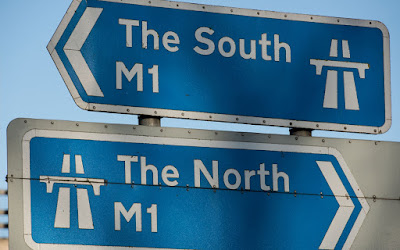Is Labour’s Prospective Economic Policy Short-sighted? The Rumoured Relocation of the Bank of England Suggests So
In this third and final post of the day, we will take a
brief look at a proposal being advanced today by the Labour Party, which
attempts to convey their commitment to redistributing wealth across the U.K.
rather than its current concentration in the South-East of the Country. This
review will only be brief because, given the political landscape, it is all
that it can be at the time of writing; however, whilst the suggested aim to
redistribute the economic dynamic across the Country is hardly surprising given
the stated aims and objectives of Jeremy Corbyn’s Labour Party, in reality the
question this suggestion raises is two-fold: is the Party operating on any
solid basis of reality, and then do they recognise the reality of the problems
i.e. their root causes, or are they focusing on and subsequently adding to the façade
that serves to preserve the current power structure? Surely, as recent and historical
evidence suggests, anything other than a ‘root and branch’ redevelopment will
have very few lasting positive consequences.
The Shadow Chancellor, John McDonnell, has commissioned
consultants to review potential options available to the Party if it wins the
next General Election, and one option that is being promoted today is that the
Bank of England, located in the City of London since 1694, should be relocated
in whole or in part to Birmingham, because the current base is ‘unsatisfactory
and leads to the regions being underweighted in policy decisions’. The
prospective move would accentuate the development of the ‘National Investment
Bank’ and the Strategic Investment Board’ in the city and would represent the
development of a new ‘economic
policy hub’. Whilst the suggestion so far is that the move would provide
for a visible representation of the Party’s determination to ‘promote
growth and a rebalancing of the economy’, the real question is ‘is that enough’
to uproot a British Institution for a ‘representation’?
Of course, the answer is ‘no’, because whilst HSBC and
potentially Channel 4 may be moving to the city, it is a different prospect
entirely moving the Bank of England. The simple reason is that uprooting the
Bank of England, so soon after the Country leaves the E.U. and faces the
prospect of battling for international trade deals which will be underpinned by
the perceived authority of the City of London as a financial centre, means McDonnell’s suggestion
will remain on the drawing board irrespective of whether the Party comes to
power or not; naturally, it is one thing suggesting policies from the
side-lines as opposed to actually governing. Yet, whilst this counteracting
point is the obvious one to make, the more obscure point is what effect would
moving the bank actually have on ‘rebalancing’ the economy? The divergence between
basic economic indicators like wages
and employment levels in both the North and the South of the country are clear
for all to see, the political battle that is being fought on the basis of
the development of the ‘Northern
Powerhouse’ suggests that devolving power and authority may fulfil the aim
of reducing the divide, but in many instances it may not. Theresa May was
earlier this year forced to respond to critics that accused her of paying lip-service
to the ideal, and whilst Labour supporters may not like hearing that their
Party has similarities to the Conservative Party, McDonnell’s suggestion implies
that this is the case; of all the things to be done, is relocating the Bank of
England a worthy option? Is it even worth us discussing based upon the fact
that diluting the influence of the City of London in the wake of Brexit is a
non-starter? Whilst this author does not support either Party, it is worth
stating that to rise to power the Labour Party should really seek to be rooted
in realism to provide a realistic alternative to the Conservative Party who
operate in a rather different way. Ultimately, the more noises we hear from the
Labour Party about how they will govern whilst they are on the side-lines,
particularly with respect like these calls today, will only serve to undermine
their chances – only root-and-branch and consistent change, over a long period,
will reduce the divide between the North and the South.
Keywords – Bank of England, Labour Party, Politics,
Birmingham, City of London, @finregmatters





Comments
Post a Comment